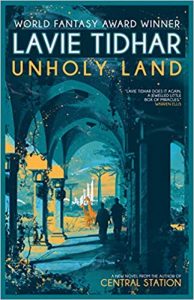Ian Mond Reviews Unholy Land by Lavie Tidhar
 Unholy Land, Lavie Tidhar (Tachyon Publications 978-1616963040, $15.95, 288pp, tp) October 2018.
Unholy Land, Lavie Tidhar (Tachyon Publications 978-1616963040, $15.95, 288pp, tp) October 2018.
In 1938 (or possibly 1939) there was a plan to settle European Jews facing rising anti-semitism in the Kimberley region of Western Australia. It never eventuated. More than a century prior, and a good 80 years before the establishment of modern-day Zionism, Mordechai Manuel Noah attempted to establish a Jewish State, called Ararat, in Grand Island NY. He failed to make it happen. Resettlement programmes that also never transpired include a Jewish homeland in Fugu (Japan), Madagascar (East Africa), Port Davey (Australia again), the far east of the Soviet Union, and British Guiana. So many possibilities, so many alternative histories, yet it’s the 1903 proposal to create a Jewish State in Uganda, mooted by Joseph Chamberlain to Theodore Herzl, that forms the basis of Lavie Tidhar’s provocative and brash new novel, Unholy Land.
Palestina, now more than a century old, continues to confront the legacy of its birth. In response to an increasing number of terrorist attacks, the government constructs a wall to keep out the descendants of those Ugandans dispossessed when the country was established. Amidst all this arrives Lior Tirosh, a pulp fiction writer of minor fame and fortune, who has come back to his birth country to visit his ailing father. Before he has a chance to unpack, Lior witnesses a terrorist attack involving a bus and a suicide bomber dressed as a Chasidic Jew, discovers that his niece has recently gone missing, and comes under investigation from the secret police – led by the enigmatic Special Investigator Bloom – when an old Army friend is found dead in Lior’s hotel room. That’s only the beginning of the weirdness. As he starts searching for his niece, taking on the role of the pulp detectives from his novels, Lior begins to experience fragments, vague memories of a reality, a life he’s never lived.
Unholy Land is a novel that’s been percolating in Tidhar’s mind for a number of years. Both Lior Tirosh and Nur (a key player in the book’s second half) are the main characters of Tidhar’s 2008 short story “Shira”, which isn’t so much a prequel as a distant cousin to Unholy Land (it also plays with the idea of multiple realities). Tidhar’s alter-ego reappears in a 2016 story, “Art and War”, which he co-wrote with Shimon Adaf. In an introduction to that piece, Tidhar talks about his “Palestine novel… I’ve been trying to write and make notes for, for a very long time.” I’m thankful that Tidhar waited until he got it right, because while Unholy Land is a playful book, one that’s as much influenced by noir and detective fiction as it is by Roger Zelazny’s Amber series, it’s also a mature and sustained piece that as a Jew and a Zionist I found both compelling and confronting. It’s not just the cognitive dissonance of having the Jews in Uganda described as Palestinians (although that’s certainly part of it), it’s also the disturbing similarities between Palestina and Israel, particularly the suicide bombers, border walls, and refugees camps. Most telling of all is how both countries were born as a response to the atrocities of the Holocaust. In the case of Palestina, Nahum Wilbusch, a member of the expedition to assess whether Uganda is fit for Jewish habitation, stumbles across a “crosshatch” a weak spot in time where he receives a terrifying vision of the future:
Trains travelling across the frozen plains, spilling out human cargo onto the ice, great gates, barbed wire walls, watchtowers, soldiers. Jews with yellow stars of David on their arms. A great fire, burning, a fire that never stopped.
Desperate to avoid this horrifying prophecy, Wilbusch chooses Uganda. Six million Jews, therefore, survive the gas chambers and yet, in their stead, hundreds of thousands of Ugandans are dispossessed. The establishment of a Jewish homeland is consequently framed as a Zero-Sum Game, an act of colonialism where the indigenous population loses out to the invading force. As a Zionist, I can’t adequately articulate how this makes me feel, how it strikes at the essence of my identity. My preference is to believe in the future depicted by Tidhar in his mosaic novel, Central Station, where Jews and Palestinians live peacefully, side by side.
While I found the subject matter challenging, there’s no denying that Unholy Land is a wildly inventive and entertaining novel that moves at a breathless gallop. If the rules that underpin the Pattern – Tidhar’s multiverse – didn’t entirely make sense to me, there’s a conviction to the storytelling that pulls you through the narrative. In the introductory piece to “Art and War”, Tidhar makes the observation that because of his niche interests, “I’m kind of resigned to a sort of obscurity by now.” It’s true that Tidhar will unlikely be a household name, but in our neck of the woods, he’s already staked a claim as the genre’s most interesting, most bold, and most accomplished writer.
This review and more like it in the January 2019 issue of Locus.
 While you are here, please take a moment to support Locus with a one-time or recurring donation. We rely on reader donations to keep the magazine and site going, and would like to keep the site paywall free, but WE NEED YOUR FINANCIAL SUPPORT to continue quality coverage of the science fiction and fantasy field.
While you are here, please take a moment to support Locus with a one-time or recurring donation. We rely on reader donations to keep the magazine and site going, and would like to keep the site paywall free, but WE NEED YOUR FINANCIAL SUPPORT to continue quality coverage of the science fiction and fantasy field.







